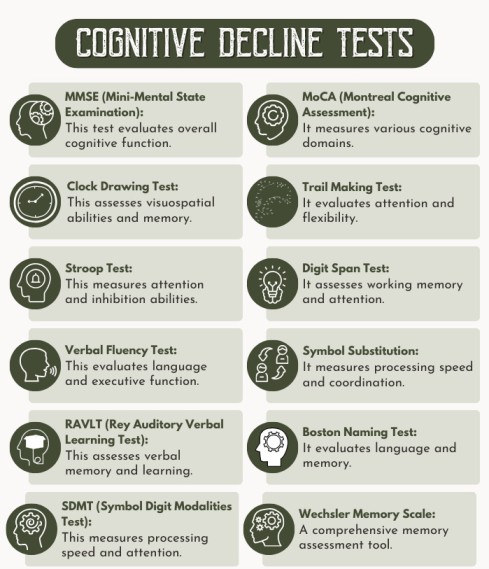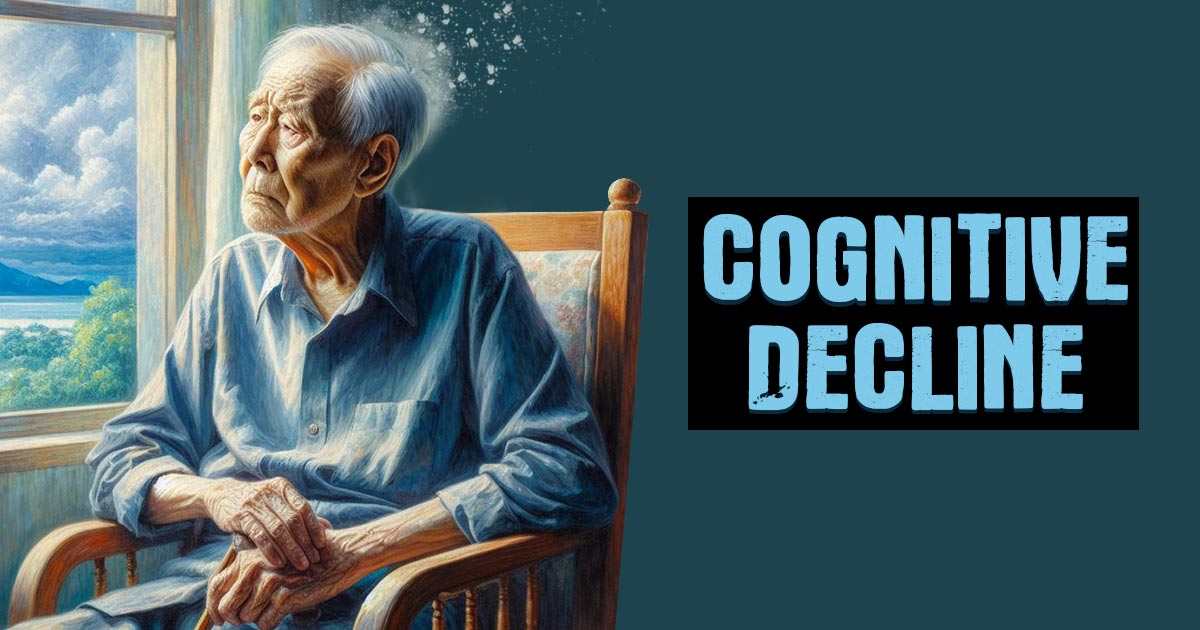Cognitive decline refers to a gradual reduction in a person’s mental abilities, including memory, thinking, attention, language, and decision-making skills. It can be a normal part of aging (such as occasional forgetfulness or slower processing), but when the decline is more significant and interferes with daily life, it may indicate a more serious condition like mild cognitive impairment (MCI) or dementia (e.g., Alzheimer’s disease).
Common symptoms of Cognitive Decline:
- Memory lapses (especially short-term)
- Difficulty concentrating
- Trouble finding words or following conversations
- Poor judgment or decision-making
- Confusion about time or place
- Mood or personality changes
Causes Can Include:
- Aging
- Neurodegenerative diseases (like Alzheimer’s or Parkinson’s)
- Stroke or brain injury
- Mental health conditions (like depression)
- Vitamin deficiencies (especially B12)
- Chronic illnesses (e.g., diabetes, hypertension)
- Substance abuse
While some cognitive decline is natural with age, a noticeable or accelerating pattern should be evaluated by a healthcare professional. Early detection can help manage symptoms and slow progression.
What Is Cognitive Decline?
Cognitive decline refers to the gradual deterioration of cognitive functions 1 Dhakal, A., & Bobrin, B. D. (2022). Cognitive Deficits. PubMed; StatPearls Publishing. Available from : https://www.ncbi.nlm.nih.gov/books/NBK559052/#:~:text=Cognitive%20deficits%20may%20accompany%20symptoms , such as memory, attention, reasoning, and problem-solving abilities, that occurs as a natural part of the aging process or due to underlying medical conditions. It involves a decrease in a person’s cognitive abilities that can impact their daily functioning and quality of life.
The symptoms of cognitive decline can vary in severity, ranging from mild cognitive impairment (MCI) to more severe forms of cognitive impairment, such as dementia. It impacts 5.1-41% of the global population 2 Pais, R., Ruano, L., P Carvalho, O., & Barros, H. (2020). Global Cognitive Impairment Prevalence and Incidence in Community Dwelling Older Adults-A Systematic Review. Geriatrics (Basel, Switzerland), 5(4), 84. https://doi.org/10.3390/geriatrics5040084 every year.
Read More About Attention Here
Signs Of Cognitive Decline
The common symptoms of cognitive decline include 3 Jessen, F., Amariglio, R. E., Buckley, R. F., van der Flier, W. M., Han, Y., Molinuevo, J. L., Rabin, L., Rentz, D. M., Rodriguez-Gomez, O., Saykin, A. J., Sikkes, S. A. M., Smart, C. M., Wolfsgruber, S., & Wagner, M. (2020). The characterisation of subjective cognitive decline. The Lancet. Neurology, 19(3), 271–278. https://doi.org/10.1016/S1474-4422(19)30368-0 :
- Memory Issues: Forgetfulness of recent events or conversations, frequent misplacement of objects.
- Communication Challenges: Difficulty finding words, repeating questions or stories.
- Decision-Making Problems: Struggling with judgments, poor problem-solving abilities.
- Disorientation: Getting lost, confusion about time, date, or location.
- Impaired Concentration: Inability to focus, difficulty following instructions.
- Reduced Motor Skills: Trouble with coordination, difficulty in routine activities.
- Personality And Mood Changes: Increased irritability or apathy, mood swings.
- Social Withdrawal: Decreased interest in social activities, difficulty engaging.
- Loss Of Independence: needing more help with tasks, managing finances.
- Confusion With Familiar Activities: struggling with routine tasks, recognizing faces inconsistently.
Read More About Memory Here
Causes Of Cognitive Decline
The various causes 4 Koliatsos V. E. (2016). A Clinical Approach to Cognitive Impairment. Focus (American Psychiatric Publishing), 14(4), 437–447. https://doi.org/10.1176/appi.focus.20160026 that trigger the symptoms of cognitive decline include:
- Normal developmental aging.
- Neuro-degenerative diseases like Alzheimer’s disease and Parkinson’s disease.
- Vascular issues like reduced blood flow, etc.
- Genetics and an inherited predisposition to cognitive decline.
- Brain injuries, like traumatic brain injury.
- Chronic illnesses like diabetes, heart disease, etc.
- Side effects of medication like antidepressants, etc.
- Disrupted sleep patterns and an unhealthy diet
- Mental health disorders like depression, anxiety, and sleep disorders.
Read More About Depression Here
Cognitive Processes That Decline Naturally With Age
The symptoms of cognitive decline are not always triggered by unnatural causes; these can also be caused by the natural aging process 5 Klimova, B., Valis, M., & Kuca, K. (2017). Cognitive decline in normal aging and its prevention: a review on non-pharmacological lifestyle strategies. Clinical interventions in aging, 12, 903–910. https://doi.org/10.2147/CIA.S132963 —impacting:
- Thinking: Slower information processing and reduced complex reasoning.
- Attention: Difficulty focusing on tasks and maintaining concentration.
- Perception: Altered interpretation of sensory information.
- Memory: Reduced recall of recent and past events.
- Learning: Challenges in acquiring and retaining new information.
- Judgment: Impaired ability to assess situations accurately.
- Decision-Making: Struggles in making sound choices based on information.
Read More About Decision-Making Here
Cognitive Decline And Mental Health
Cognitive decline and mental health are inversely related to each other. Cognitive decline leads to frustration, anxiety, and reduced self-esteem due to diminishing abilities.
Depression can emerge as individuals struggle with loss of control and isolation due to communication difficulties, impacting their overall sense of purpose and satisfaction. Caregivers also face emotional stress, burnout, and sadness—contributing to strained relationships and community-wide challenges 6 Gray, M., Gills, J. L., Glenn, J. M., Vincenzo, J. L., Walter, C. S., Madero, E. N., Hall, A., Fuseya, N., & Bott, N. T. (2021). Cognitive decline negatively impacts physical function. Experimental gerontology, 143, 111164. https://doi.org/10.1016/j.exger.2020.111164 .
Mental Health Conditions Associated With Cognitive Decline
Research 7 Morozova, A., Zorkina, Y., Abramova, O., Pavlova, O., Pavlov, K., Soloveva, K., Volkova, M., Alekseeva, P., Andryshchenko, A., Kostyuk, G., Gurina, O., & Chekhonin, V. (2022). Neurobiological Highlights of Cognitive Impairment in Psychiatric Disorders. International journal of molecular sciences, 23(3), 1217. https://doi.org/10.3390/ijms23031217 confirms the close association between cognitive decline and mental health disorders, including:
- Depression
- Mood disorders
- Anxiety Disorder
- Stress disorders
- Dementia
- Alzheimer’s disease
- Parkinson’s disease
Read More About Dementia Here
How To Diagnose Cognitive Decline
Diagnosing the symptoms of cognitive decline involves a holistic approach 8 McCollum, L., & Karlawish, J. (2020). Cognitive Impairment Evaluation and Management. The Medical clinics of North America, 104(5), 807–825. https://doi.org/10.1016/j.mcna.2020.06.007 , combining medical history, physical examinations, cognitive screening tests, neuro-psychological evaluations, brain imaging, laboratory tests, genetic analysis, and clinical assessments by specialists.
This comprehensive process helps differentiate normal aging from pathological decline, enabling early intervention, appropriate management, and support for affected individuals and their caregivers.
How To Reverse Cognitive Decline
Measures on how to reverse cognitive decline usually involves a multifaceted approach comprising of:
- Professional treatment methods 9 Wray, L. O., Mavandadi, S., Klaus, J. R., Tew, J. D., Jr, Oslin, D. W., & Sweet, R. A. (2012). The association between mental health and cognitive screening scores in older veterans. The American journal of geriatric psychiatry : official journal of the American Association for Geriatric Psychiatry, 20(3), 215–227. https://doi.org/10.1097/JGP.0b013e3182410cdb like therapy and support groups offer emotional assistance to both individuals and caregivers coping with cognitive decline.
- Light therapy utilizes specific light wavelengths to affect brain function, circadian rhythms, mood, sleep, and cognitive performance, potentially assisting in reversing cognitive decline.
- Some medications, such as cholinesterase inhibitors and memantine, are prescribed to manage symptoms of cognitive decline, especially in conditions like Alzheimer’s disease.
- Neurofeedback enables individuals to enhance cognitive function and potentially reverse cognitive decline by self-regulating brain activity through real-time monitoring of neural patterns and receiving brainwave activity feedback.
- Cogmed Working Memory Training is a structured cognitive training program designed to improve working memory, a crucial aspect of cognitive function.
- Cyclic Variations in Adaptive Conditioning (CVAC) employs controlled atmospheric pressure and oxygen changes to potentially enhance cellular function, oxygenation, circulation, and brain health, aiding cognitive restoration.
- Cognitive rehabilitation is designed to strengthen cognitive abilities and enhance memory, attention, and problem-solving skills.
How To Prevent Cognitive Decline
Consider the following measures 10 Taylor, W. D., & Reynolds, C. F., 3rd (2020). Psychiatry’s Obligation to Treat and Mitigate the Rising Burden of Age-Related Mental Disorders. JAMA psychiatry, 77(1), 5–6. https://doi.org/10.1001/jamapsychiatry.2019.2111 on how to prevent cognitive decline:
- Brain Exercises: Puzzles, games for cognitive challenge.
- Physical Activity: Exercise for better brain blood flow.
- Healthy Diet: Nutrient-rich foods, omega-3s.
- Adequate Sleep: Quality sleep aids memory.
- Stress Reduction: Deep breathing, meditation.
- Social Interaction: Stay connected for engagement.
- Mental Stimulation: Read, learn, be creative.
- Limit Alcohol And Smoking: Reduce both for brain health.
- Hydration: Stay hydrated for cognitive function.
- Routine: Maintain a consistent daily schedule.
Read More About Stress Here

Takeaway
In the complex terrain of cognitive decline—where memory, thinking, and identity are deeply interwoven—our growing understanding offers a powerful beacon of hope. As we delve into its causes, recognize its symptoms, and explore meaningful interventions, we lay the foundation for a better quality of life—not just for those affected, but also for their families and communities.
Cognitive decline is not an unavoidable destiny, but a challenge that can be addressed with timely action, compassion, and informed care. This realization encourages resilience, empathy, and a commitment to lifelong learning.
By harnessing the power of knowledge, human connection, and collective effort, we move toward a future where cognitive health is supported and safeguarded. Each step forward reaffirms our dedication to protecting the very core of what makes us who we are.
At A Glance
- Cognitive decline, a natural part of aging, impacts cognitive functions and mental health.
- The symptoms of cognitive decline include memory issues, communication challenges, and disorientation.
- Causes of cognitive decline range from aging to neurodegenerative diseases and chronic conditions.
- Measures on how to reverse cognitive decline involve cognitive training, medications, and support.
- Measures on how to prevent cognitive decline emphasize changes in lifestyle factors for brain development and mental health.
Frequently Asked Questions (FAQs)
1. What protects adults from cognitive decline?
Engaging in regular physical exercise, maintaining a healthy diet, and staying mentally active can help protect adults from cognitive decline.
2. How do you monitor cognitive decline?
Cognitive decline can be monitored through regular assessments, cognitive tests, and medical evaluations conducted by healthcare professionals.
3. What if my family or friends show symptoms of cognitive decline?
If family or friends exhibit symptoms of cognitive decline, it’s important to encourage them to seek medical advice for proper diagnosis and intervention.















